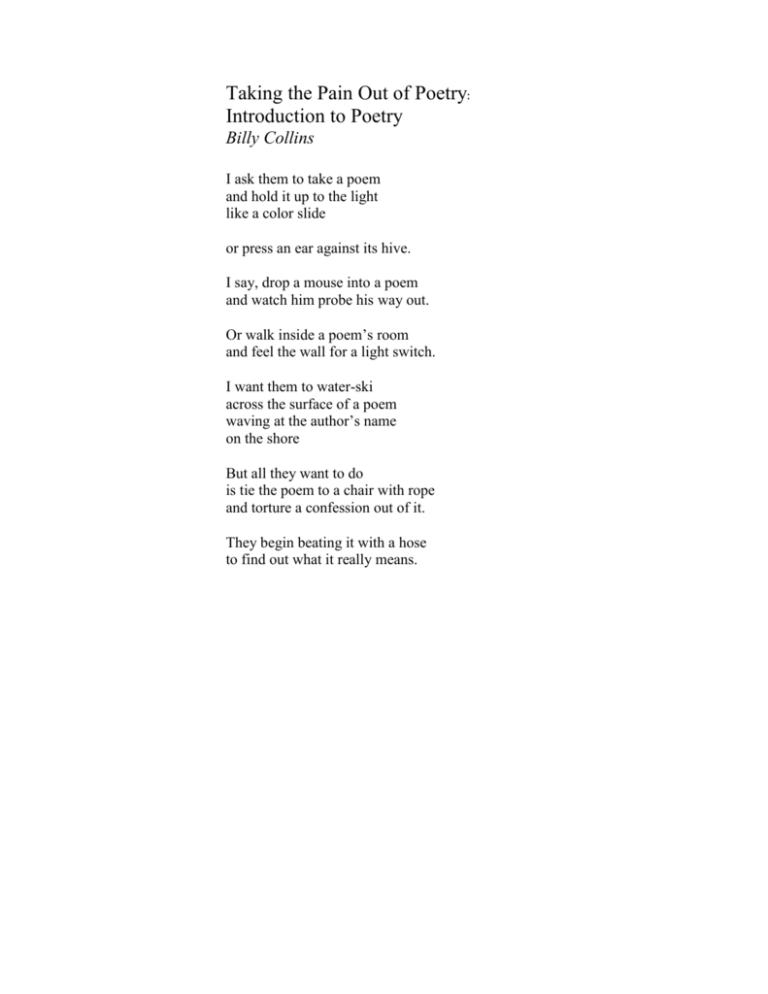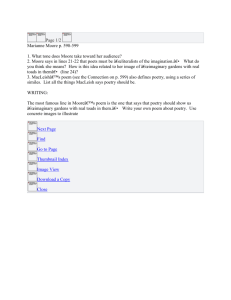Document
advertisement

Taking the Pain Out of Poetry: Introduction to Poetry Billy Collins I ask them to take a poem and hold it up to the light like a color slide or press an ear against its hive. I say, drop a mouse into a poem and watch him probe his way out. Or walk inside a poem’s room and feel the wall for a light switch. I want them to water-ski across the surface of a poem waving at the author’s name on the shore But all they want to do is tie the poem to a chair with rope and torture a confession out of it. They begin beating it with a hose to find out what it really means. Ty Knotts Billy Collins’ Taking The Pain Out Of Poetry Oh man. Thank you, Billy. You have said it. You have said it for all of us English teachers who feel poetry is actually worthwhile, all of us whose students groan and roll their eyes as soon as they see anything that even looks like a poem. We want them to enjoy poetry; we want them to bask in it like they do sunshine at the beach, not concerned with the point of sitting there beneath the sun—just enjoying it. But you’re right: Their only concern is what it means—as if it’s an encrypted message from aliens warning of impending doom and they have to crack the code before their teacher asks them what they think. Here’s my only problem: Isn’t there more to the story? I mean, if students see a poem as impending doom, isn’t that our fault? What have we done to poetry in our Literature classes that they only seek after what it means? Are students just used to poems whose language is either so complex or so antiquated that they have trouble understanding it—poems whose diction and syntax is nothing like the way in which people speak and write today? Is that all we’ve given them as teachers—poems from the 1800s or earlier? Because we have to remember: Poetry does not serve the same function it did in 1840. People do not read poetry for entertainment. Poetry is not a part of our pop culture (unless you consider song lyrics—which are still often ignored). Students are not introduced to poetry as a child and then inundated with it like they are viral videos or the Internet. Students have YouTube and Facebook—with their many links and referrals. Perhaps if students had listened to Henry Wadsworth Longfellow and Oliver Wendell Holmes as children they would enjoy reading them now, they would understand them now. But that’s not the case. Or…have we not taught them how to enjoy poetry? Perhaps we have simply jumped straight to each poem’s meaning without teaching them how to find it. Or perhaps we have simply not shown them poems that are enjoyable—at least to those who aren’t experts of them. Everyone loves Shel Silverstein. Everyone loves Dr. Seuss. And yes, that is certainly the baby food of the culinary world, the mac and cheese to our adulthood’s sautéed kale with garlic and red wine vinegar. But taste has to develop. And it’s our job to develop it—to transition our students from The Cat in the Hat to The Chambered Nautilus. So while I love the way you captured a sentiment I often feel, I just want to add on: Though I know many students don’t care—don’t even try getting to know Poetry—I think there are teachers for whom you can say the same. In class, at least, taking the pain out of poetry is a combined effort. This Is Just To Say William Carlos Williams I have eaten the plums that were in the icebox and which you were probably saving for breakfast Forgive me they were delicious so sweet and so cold E. Mo Stewdent William Carlos Williams’ This is just to say So many people think there’s nothing special about this poem—that it can’t be great because it doesn’t look or read or feel like a ‘great’ poem. There’s no fancy or figurative language, there’s no symbolism or metaphorical imagery; it’s just simple language depicting a simple incident that could have been written by the simplest of minds. But I think that’s why it gets exhibited in my brain’s museum year after year. Poetry is not limited by the things that usually bore and incite high schoolers. Poetry can be filled with the commonplace. And by relying on the commonplace, Williams has written a poem I find quite uncommonly delightful. I can just picture the narrator of this poem hastening into the kitchen at 7:00 a.m., dressed for work, still steaming about being forced to sleep on the couch. He’s hungry, but he doesn’t have much time. He’s slightly overweight, and his doctor told him to eat healthier. So, not thinking (which is exactly the type of thing that got him into the fight with his wife in the first place), he grabs the first thing(s) in sight. Right before taking the first bite, it occurs to him whose plums they are, and the vindictive side of him takes over. He eats the plums, and then…His wife said he should be the one to apologize. So he reaches for a pen, then the magnetic note-pad of 3x8 paper stuck to the fridge, and writes her a little ‘good morning’ note. How’s that for an apology! See, the poem is just so human! Every lover has written his/her counterpart a ‘this is just to say’ letter. Every person has done something they knew—even in the moment—they shouldn’t be doing. And every person knows that sometimes sin tastes better than virtue. (Of course, the narrator could have stumbled into the kitchen in a daze, hazy from having not fully woken; he could have accidentally eaten the plums, then realized his mistake, and written the note in full contrition. But there you go—another every-man experience!) The simplicity of the moment, the simplicity of each line, the simplicity of each adjective—no one can say they can’t ‘enter’ this poem. And frankly, from the title to the last stanza (perhaps especially because of the title and the last stanza), it just makes me smile. A wry smile? A giddy smile? Yes.






